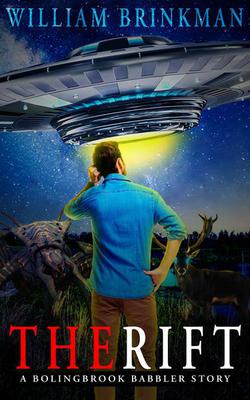The Rift is a short novel by fellow FTBer William Brinkman. It’s a fictionalized version of the feminist wars in skepticism, one where the skeptics work for the aliens. I was provided with a review copy.

I admit I’m not very familiar with Brinkman’s Bolingbrook Babbler, but I know Brinkman has been writing it since 1998, and that he has perfected a style of satirical fiction where real (often political) events are mixed with the fantastical. Like The Onion, you might say, but long form. I also know that some of it is quite topical, covering issues in atheism and skepticism.
The specific focus on skepticism produces interesting results, where the skeptical movement is juxtaposed with the reality of the paranormal. It’s delightfully absurd, but also hints at deeper interpretations. It implies a dilemma: do you side with the skeptics, who conceal the truth even as they fight for it, or do you speak the unbelievable truth? It explores, in a metaphorical way, the faults of the skeptical movement—something that can be quite difficult to talk about in a non-fictional context, if I do say so myself!
Nowhere are the faults of skepticism more apparent than in its dealings with feminism and social justice.
Many readers would know this history, but I explain it for the younger folks… in 2011 there was Elevatorgate. In a video, Rebecca Watson mentioned being propositioned in an elevator, and explained why this was a faux pas. For her remarks, Watson received death threats and harassment for a decade. Then some major figures in the movement were plausibly accused of sexual violence, SkepChick withdrew in protest from The Amazing Meeting, and all the rest.
The Rift contains a fictionalized version of Elevatorgate, with the protagonist playing the role of Elevator Dude. In the years following the elevator incident, he joins forces with MRAs, campaigning against the destructive influence of feminism. But one night, he’s attacked by a weredeer, precipitating a redemption arc.
Although there are paranormal and sci-fi elements to the story, they mostly take a backseat. The focus is more on the rift in the skeptical movement than it is on the literal rift in spacetime.
Now there are a few issues inherent to the redemption arc. For one thing, it turns a jerk into a hero, just because he learned to be less of a jerk. I’m not sure there’s any avoiding that. But perhaps it’s less of a redemption arc and more of a wish fulfillment fantasy, where our wish is to persuade an MRA that he was wrong all along, and for feminism to win in the end. It seems rather optimistic, but I can dig it.
Some of my readers, I’m sure, have never had an interest in the skeptical movement, and for those folks, I think the book may be a hard sell. It has a few too many characters to keep track of, if you’re not aware of any of the people and factions that the characters echo. I think to an outsider it may also come off as self-aggrandizing, in the way that it places the skeptical movement in a position of cosmic importance.
But if you’re interested in the topical nature of the premise—and aren’t so traumatized by Elevatorgate that you never want to hear about it again—you might like this. I had a lot of fun with it.

Leave a Reply